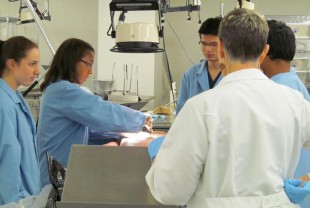Oct 13 2015
Rice University and the University of Texas MD Anderson Cancer Center have won a five-year, $1.8 million grant from the National Cancer Institute (NCI) to train graduate students and postdoctoral research associates to translate nanotechnology breakthroughs into clinical treatments for cancer patients.
 Graduate student trainees from the Rice-MD Anderson Med Into Grad program undergoing pathology training in 2014. Rice and MD Anderson have launched a new training program in translational cancer nanotechnology that is based on Med Into Grad. Credit: IBB/Rice University
Graduate student trainees from the Rice-MD Anderson Med Into Grad program undergoing pathology training in 2014. Rice and MD Anderson have launched a new training program in translational cancer nanotechnology that is based on Med Into Grad. Credit: IBB/Rice University
“There has been exponential growth in cancer-related nanotechnology research over the past decade, and there is a growing gap between the pace of these discoveries and their translation into clinical practice,” said Rebecca Richards-Kortum, director of Rice’s Institute of Biosciences and Bioengineering and co-principal investigator on the grant. “Rice and MD Anderson are ideally positioned to provide the specialized training that is urgently needed to address this gap.”
Scientists and clinicians alike have long dreamed of using nanotechnology — the science of understanding and manipulating matter at the atomic and molecular scales — to solve problems related to cancer management, including very early cancer detection, accurate molecular-specific diagnoses of cancer and treatments that diminish side effects. Rice, long a world leader in nanotechnology, recently announced plans for a $49 million strategic re-investment in the field.
The new Rice-MD Anderson training program will have two tiers: a predoctoral program that will provide mentorship, training and funding for two years to qualifying students who have been accepted into a Rice doctoral program in bioengineering, chemistry or applied physics; and a postdoctoral program that will provide two-year fellowships to recent Ph.D. awardees with training in physical science, chemistry or bioengineering with a demonstrated background and interest in nanotechnology. Holders of an M.D. degree will be eligible if they show a strong interest in translational cancer nanotechnology research.
“This multidisciplinary program is designed to include both hands-on coursework and seminar experiences as well as mentorship of translational research projects,” said Stacey Kalovidouris, executive director of Rice’s Institute of Biosciences and Bioengineering, which will administer the Rice portion of the program.
Kalovidouris said all incoming trainees will participate in a two-week boot camp named Cancer Management and Nanotechnology, or CanManageNano. The boot camp provides an overview of current opportunities and barriers in the field. Trainees also will take four courses related to translational cancer or nanotechnology topics, and they will work with at least two program faculty mentors, one from Rice and one from MD Anderson, to define and carry out an independent research project.
“Trainees will leave the program with a deep understanding of crucial aspects of translational research in cancer nanotechnology, with the most important component being the demonstrated ability to carry out independent translational research,” Kalovidouris said.
Richards-Kortum, Rice’s Malcolm Gillis University Professor and professor of bioengineering and of electrical and computer engineering, said the NCI program grew from Rice’s successful Med Into Grad program, which graduated its last group of trainees this year. Med Into Grad was launched in 2006 as a joint Ph.D. training program between MD Anderson and Rice’s Department of Bioengineering and was expanded to include Rice’s Department of BioSciences and the university’s Ph.D. program in systems, synthetic and physical biology. Fifty-three students have graduated from Med Into Grad, which was supported by two grants from the Howard Hughes Medical Institute.
“Med Into Grad allowed Rice to establish a new Ph.D. track in translational bioengineering for cancer diagnostics and therapeutics, and it helped train a new generation of scientists who are uniquely prepared for careers at the interface of bioengineering, cancer biology and oncology,” Richards-Kortum said. “We are grateful to the National Cancer Institute for allowing us to continue the work begun in Med Into Grad, and most importantly, to expand the program to include postdoctoral researchers.”
MD Anderson co-principal investigators are Konstantin Sokolov, professor of imaging physics and director of the Biomedical Optics and NanoDiagnostics Laboratory, and Sunil Krishnan, professor of radiation oncology and director of translational research for the gastrointestinal cancer service of the Department of Radiation Oncology.
Students and postdocs interested in applying to the Rice-MD Anderson Interdisciplinary Translational Pre/Postdoctoral Program in Cancer Nanotechnology should contact [email protected].